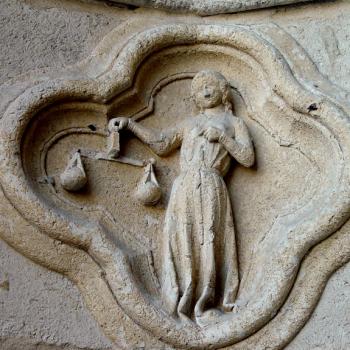
Thou shalt love the Lord thy God with all thy heart, and thou shalt love thy neighbor as thyself. These are the two guiding principles of the Law of Moses, the principles which will never go away. Many theologians have suggested that the two tablets on which the Ten Commandments were divided likely represented these two principles, one tablet for God and what is expected of us concerning our love for God, and the other in regards humanity, and what love for our neighbor should entail. The Ten Commandments, indeed, the Mosaic Law in its entirety, should be seen as serving and pointing to these two principles. To fulfill the law is to fulfill them. To disregard them is to break the law.
Understanding this, Paul tells us we owe each other what the law commands of us: love of our neighbor:
Owe no one anything, except to love one another; for he who loves his neighbor has fulfilled the law. The commandments, “You shall not commit adultery, You shall not kill, You shall not steal, You shall not covet,” and any other commandment, are summed up in this sentence, “You shall love your neighbor as yourself.” Love does no wrong to a neighbor; therefore love is the fulfilling of the law (Rom. 13:8-10 RSV).
If we want to fulfill the law, we will follow the dictates of love. If we want to understand the spirit of the law, we will look for how and why each particular command relates to the two great commandments. Except for particular sins which directly relate to our relationship with God (such as idolatry), most sins come out of our failure to properly love our neighbor. Lust, for example, leads us to objectify and use our neighbor as an object for our own personal pleasure. It is selfish instead of self-giving, seeking dominance and control instead of mutual affirmation. Greed makes us disregard the needs of our neighbors as we try to take and make all things our own. Anger has us unjustly assault our neighbor, disregarding their inherent dignity. “For the whole law is fulfilled in one word, ‘You shall love your neighbor as yourself.’ But if you bite and devour one another take heed that you are not consumed by one another” (Gal. 5:14-15 RSV). When we disregard the good of our neighbor, when think we owe them nothing, that we do not need to be good to them, they will respond in kind. The cycle of violence begins with our own disregard for the commands of God, and so it should likewise end with us.
It can be, and often is, difficult to help neighbor because we do not have the means to do so. If we are poor, if we do not have the resources which they need, we can try to find people who do and ask for their help. But, if those we know likewise are as impoverished as we are, there are still other ways we can seek to help our neighbor, to treat them with charity. Joseph of Panephysis, one of the desert fathers, lived in a community where such material resources were scarce, and yet he realized that he and his fellow monks still had to find a way to live out the commandments of God. Thus, he pointed out that how he and his fellow monks thought of others should serve as the foundation for their charity. His advice is good not only for them, but for us as well. He said we should guard our thoughts so that we do not abuse our neighbor in them, and this could lead us to our salvation:
A brother asked Abba Joseph, saying, ‘What should I do, for I do not have the strength to bear evil, nor to work for charity’s sake?’ The old man said to him, ‘If you cannot do any of these things, at least guard your conscience from all evil with regard to your neighbour and you will be saved.’[1]
Not everyone can do the same thing. God doesn’t ask us to do the impossible, which is why he doesn’t ask us all to do the same thing. Likewise, God doesn’t expect us to all be the same. Not everyone can endure unjust suffering the same. Not everyone is capable of corporal works of mercy. But everyone can and should find a way to love their neighbor as themselves, and to realize that if they do not do so, they risk losing their own salvation. “Let no one seek his own good, but the good of his neighbor” (1 Cor. 10:24 RSV).
Of course, by doing loving our neighbor, we will also be helping ourselves. We are in this together. What helps our neighbor will help us. If we help them become better, if we help them experience some greater good due to our love, we will be able to experience the ramifications of that good for ourselves. Likewise, if we harm others, if we cause them pain and suffering, we will experience the ramifications of our evil actions as well. This is why when we lie, when we purposefully mislead others, we not only hurt them, but ourselves. “Therefore, putting away falsehood, let every one speak the truth with his neighbor, for we are members one of another “(Eph. 4:25 RSV).
The law is summed up by love. The way we are to deal with others should come out of love. The Mosaic Law can be seen as a commentary on the law, the law of love, explaining how the people of Israel, in their own particular circumstances, should act in regards the law of love. The principles behind the law remains, and they shall never go away. The Law of Moses, therefore, remains true, so long as we understand the meaning behind the Law of Moses. If we misunderstand its point, if we go by the dead letter rather than the Spirit, we are not following the Law of Moses, because the Law is true and is centered upon the two ways in which we are to embrace love. If we understand that point, we can and will find ourselves fulfilling that law, even if we do not follow all the various commandments Moses gave to elucidate the Law. This is why there is no abrogation of the Law. It remains in place, for love never fails.
[1] The Sayings of the Desert Fathers. Trans. Benedicta Ward (Kalamazoo, MI: Cistercian Publications, 1984), 102-3 [Joseph of Panephysis Saying 4].
Stay in touch! Like A Little Bit of Nothing on Facebook.
If you liked what you read, please consider sharing it with your friends and family!













